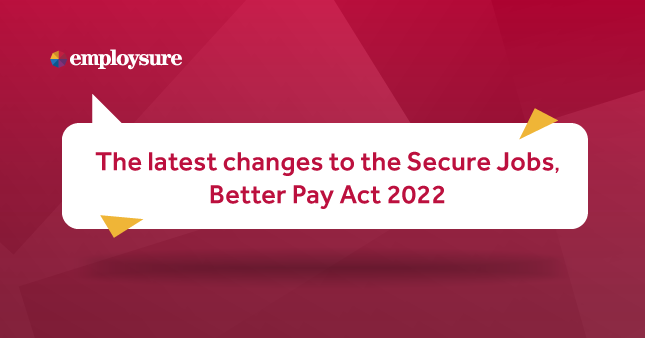
What is the Fair Work Act?
The Fair Work Act 2009 (the Act) is one of the primary pieces of legislation that govern the employment relationship in most of Australia’s private workplaces. It is the foundation of all minimum standards and regulations for employment that fall within the national workplace system. The Act is something that employers in all industries and with all business sizes that fall within that system should be familiar with.
Fair Work Act Summary
The terms and conditions for employment and rights and responsibilities for employees and employers in relation to that employment which are outlined within the Fair Work Act 2009 are intended to provide a balanced framework for productive workplace relations which promotes national economic prosperity and social inclusion for employees under the national workplace system.
It aims to do this by:
providing for terms and conditions of employment
setting out rights and responsibilities of employees, employers and organisations in relation to that employment
providing for compliance with and enforcement of the Act
providing for the administration of the Act by establishing the Fair Work Commission and the Fair Work Ombudsman
On top of these provisions and guidelines, the Act also gives employees a guaranteed safety net of fair, relevant and enforceable minimum terms and conditions through the National Employment Standards (NES), Modern Awards and National Minimum Wage orders.

FREE Fair Work Act Guide Download
Understand your workplace rights and responsibilities under the Fair Work Act today!
National Employment Standards (NES).
Among the Fair Work Act’s previously mentioned purposes, it includes a provision of 10 legislated National Employment Standards (NES). These minimum standards are mandatory for employees covered by the national workplace relations system regardless of industry, business size or unique circumstance. The purpose of these standards is to protect minimum entitlements of employees working in Australia under the national system regardless of their award, registered agreement or employment contract and as such they are unbiased and cover the following areas:
maximum weekly hours of work
right to request flexible working arrangements
parental leave and related entitlements
personal/carer’s and compassionate leave and family and domestic violence leave
notice of termination and redundancy pay
If you are looking for more information on the National Employment Standards, visit Employsure’s guide for a comprehensive explanation of what the Standards involve and how they might apply to your business.
Fair Work Act & Modern Awards
While the National Employment Standards provide a base level of provisions which are applicable to all employees in the national workplace system, most minimum entitlements for wages and employment conditions are found in Modern Awards or registered agreements. The Fair Work Act 2009 also contains provisions for Modern Awards and registered agreements which provide an additional set of minimum entitlements and conditions for employees, within which employers must operate employment agreements for certain industries, occupations or, in case of a registered agreement, group of employees within a business or group of businesses.
These awards and registered agreements also provide additional enforceable minimum employment standards for specific job roles within both the industries and occupations that they cover. In short, employers must provide their employees with at least their minimum entitlements under the relevant award or agreement.
If an industry or occupation is not covered by a Modern Award, there is a Miscellaneous Award which generally covers employees who are not covered by any other Modern Award or else the employee is Award-free, in which case the NES will still apply.
The conditions of Modern Awards and registered agreements are administered by the Fair Work Commission.
Modern Awards and registered agreements such as Enterprise Agreements typically contain terms and entitlements relating to minimum wages, penalty rates, types of employment, flexible working arrangements, hours of work, rest breaks, classifications, allowances, leave and leave loading, superannuation, and procedures for consultation, representation, and dispute settlement. As well as the above areas, Modern Awards and agreements may also cover terms about industry specific redundancy entitlements – that is, additional provisions regarding what employees who are being made redundant are entitled to within a certain industry. Visit Employsure’s guide on Modern Awards to find everything you need to know about this important aspect of employment relations.
National Minimum Wage.
As the name suggests, a minimum wage is the base rate an employee is entitled to be paid for their ordinary hours of work. The minimum wage which an employee is to be paid is determined by the specific industrial instrument which they are employed under whether it be a Modern Award, Enterprise Agreement or National Minimum Wage order.
Minimum wages under modern awards may differ depending on the employee’s employment type, age or work capacity and can include:
wages rates for adults, in some cases, at different rates according to experience and qualifications
wage rates for juniors, employees with a disability, and employees to whom training arrangements apply
casual loadings
Regardless of which industrial instrument the employee is working under, they cannot be paid an amount less than the national minimum rate of pay or the minimum award rate of pay for the specific job that they do, even if a different amount is agreed upon by the employee.
The national minimum wage and pay rates under Modern Awards are not set indefinitely. Both are reviewed by the Fair Work Commission (FWC) every year. This is to determine if an increase is required based on national living standards, and any changes to the national minimum wage or pay rates under Modern Awards need to be in effect well in advance of the next financial year starting. It is important for employers to remain vigilant in being aware of any changes to their relevant Modern Awards or national minimum wage to ensure that they are not underpaying their employees.
The Fair Work Commission and The Fair Work Ombudsman.
Of course, the practical application of the Fair Work Act 2009 and any other underlying entitlements in workplaces is not entirely left to the discretion of employers. There are two regulatory agencies which oversee the correct adherence to the Act in workplaces around Australia: the Fair Work Commission and the Fair Work Ombudsman. Together, these agencies administer, govern, and cooperate fair work within Australia. To be more specific about what the two bodies work to achieve:
the Fair Work Commission administers the provisions of the Act, making, reviewing and updating the legislation, awards or registered agreements including award entitlements, and national minimum wages, and it also operates as a tribunal to hear disputes and make rulings for employee claims regarding unfair dismissal and unlawful terminations or bullying and harassment
the Fair Work Ombudsman provides information, advice and guidance on the Act, ensures compliance and investigates allegations of breaches of the Act in the workplace and is responsible for enforcement
You can learn more about the Fair Work Commission and the Fair Work Ombudsman by visiting Employsure’s e-guide here.
As a business owner or employer in Australia, you are generally bound by the Fair Work Act 2009 and are responsible for treating all of your employees fairly and issuing them with the correct entitlements. Under the Act, employee entitlements such as the NES, Modern Awards and Enterprise Agreements set the minimum pay rates and conditions and contracts cannot take away the minimum entitlements found in the NES or appropriate Modern Award. So it is important to be well informed of your obligations under the Act.
Like most items of legislation, the Fair Work Act 2009 can be complex. It is understandable that business owners and employers may find themselves confused by the complex language.
For peace of mind about your obligations, call us today on 1300 651 415 and speak to a specialist.
Employsure and the Fair Work Ombudsman
Between July 2020-June 2021 Employsure advice team had 400,779 cases. During the same period the Fair Work Commission had 104,774 calls to their information line and the Fair Work Ombudsman received 375,921. Last year Employsure answered more calls than the Fair Work Ombudsman. With free initial advice we are open to all business owners who have a question on workplace relations or WHS.
Call For Free Initial Advice
Call Our Team of Advisers Who Will Help You with Your Workplace Questions.
Frequently Asked Questions
What is the purpose of the Fair Work Act 2009?
The purpose of the Fair Work Act is to introduce a national workplace relations system that sets minimum standards and conditions for employees and provides the legal framework for employer-employee relations for the majority of workplaces in Australia.
Who does the Fair Work Act apply to?
The Fair Work Act applies to employers and employees who fall under the national workplace relations system. Broadly, this system covers all private sector employers and employees – minus those who fall under the WA state system.
Who does the Fair Work Act 2009 protect?
The Fair Work Act protects employees employed by business covered by the National workplace relations system and provides a workplace relations framework for both employers and employees.
Who is not covered by Fair Work Act?
The Fair Work Act does not cover employers and employees not under the national workplace relations system. In other words, this means:
- state public sector or local government employment or employers who are non-constitutional corporations in the private sector in Western Australia ie:
-
- sole traders
- partnerships
- other unincorporated entities
- non-trading corporations
provided they are not covered by a registered agreement under the national system
- state public sector and local government employment in NSW, Queensland and South Australia that don’t have registered agreements covered by the national system
- state public sector employment in Tasmania. Local government employees are covered by the national system.
The Fair Work Act also does not cover workplace health and safety legislation, nor does it fully provide for anti-discrimination legislation.
What does the Fair Work Act cover?
The Fair Work Act broadly covers workplace relations, and provides for the minimum employment standards and regulates on a range of employment and industrial matters. It also provides for the establishment of the Fair Work Commission and Fair Work Ombudsman, organisations that administer and enforce the Fair Work Act, respectively.
Is everyone covered by a modern award?
Not every employee or employer is covered by a Modern Award or registered agreement. There are some roles and industries that not covered by a Modern Award, even the Miscellaneous Award . The Miscellaneous Award does not cover managerial employees and professional employees such as accountants and finance, marketing, legal, human resources, public relations and information technology specialists, so these may be award free, but it will depend on the employee’s duties and their employer’s industry.
Is the Fair Work Commission a government body?
The Fair Work Commission, along with the Fair Work Ombudsman, is an independent agency of the Federal Government created by the Fair Work Act 2009, whose role includes making and varying awards, approving registered agreements, setting minimum wages, and dealing with a range of disputes



